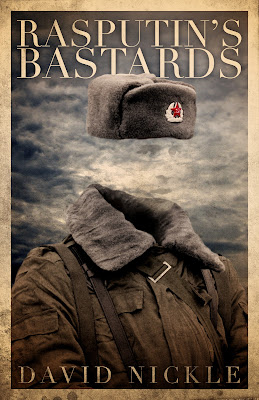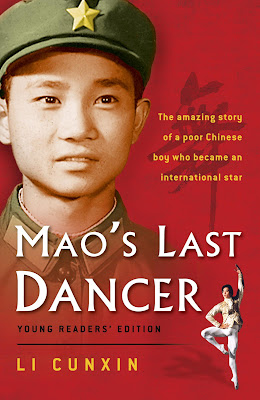Rasputin's Bastards
By David Nickle
I'm not dumb, you know. You might think I'm dumb because of the casual manner in which I write this blog or my persistent use of street language or the fact that I like to grow bushy Appalachian style mustaches, but I'm not. You know why I know I'm not dumb? I mean, besides the fact that I read books? I like crosswords.
I'm good at crosswords, too. Give me a good crossword and a few hours and I'm a very happy man. There was a time a few years back when the New York Times Sunday Crossword was something I could solve with confidence, usually by Thursday. Hell, I even have strong opinions about Scrabble (the U should be worth 2 points and ZA should be stricken from the Scrabble dictionary). Needless to say, I'm a bit of a wordsmith and, to be sure, I've never met a crossword puzzle I couldn't tackle.
That is, except cryptic crosswords.
You know the crosswords I'm talking about. The impossibly difficult crosswords next to the conventional crosswords that are actually solvable? The weird red-headed step-cousin of the normal crossword? The ones with clues such as: Very cold parrot starting a course of action (solution: Policy... (I mean I see where they got it but, seriously... WTF!?!)). I'm convinced that the cryptic crossword is an elaborate joke played on humanity, the literary equivalent of conspiracy theories and free jazz. Only a handful of ultra-hip crossword nerds are in on the joke and they get together on weekends to laugh there masking taped glasses off at the thought of us orthodox crossworders taking half-hearted stabs at otherwise meaningless puzzles.
Yeah, well, that's what Rasputin's Bastards felt like to me.
Well, to be entirely fair, I have proven to be extremely unreceptive to spy novels as a whole. The few times I have delved into the world of espionage fiction I have emerged with severely sprained brain cells and deeper-than-usual brow furrows. I'm no idiot, but for some reason I find the plots in spy novels to be impossible to follow, no matter how articulately I move my mouth when I I read. All those double crosses and good guys in bed with bad girls who are actually bad guys pretending to be good girls pretending to be bad girls (or something like that). I'm not good with that level of plot twisting. Note my complete and utter confusion in response to John le Carre's classic novel Tinker, Tailor, Soldier, Spy. I'm probably not the best judge of these sorts of novels but this is what I get for choosing to review a novel based on my love for peculiar historical personalities and a stupid Boney M song.
So Rasputin's Bastards is ostensibly a post-Cold War spy novel that is equal parts Inception and Invasion of the Body Snatchers (with a healthy dash of new-agey metaphysics thrown in for good measure). It chronicles two generations of Soviet spies trained at a place called City 512 that may or may not exist somewhere in Russia. These spies have the ability to dream-walk (step into their consciousness and drive them, so to speak) other human beings (known colloquially as sleepers). Some of these dream walkers know who they are, others do not. None of the sleepers know that they are being manipulated by a mysterious Russian woman known as Babushka. The dream-walkers can also move about in fabricated planes plane known as metaphors. Along the way there is an undersea laboratory in the middle of the Atlantic Ocean populated by (for lack of a better term) Morlocks, mysterious cities on the otherwise barren coast of Labrador, fourteen story hotels in downtown Manhattan that nobody can see, Turkish gangsters with severe memory blocks and lots of giant squids.
Yeah, well, actually when I put it that way, it does sound pretty freaking cool.
The problem for me was twofold. First, I couldn't muster enough connection with the characters to care what happened to any of them. Perhaps I missed it, but I would have really benefitted from a little more back story about dream-walking, how it was used by the Russians during the Cold War and how, exactly, it connected to known points in history and, of course, Rasputin. All of these issues were explained but never with the depth I thought was necessary for full immersion into the narrative. A shame because I would have liked a clearer understanding of this power and how it played out in the context of geo-political power struggles.
Second, the story is so decidedly convoluted, it becomes hopelessly tangled in itself (my fundamental problem with Inception as well, I might add). Complicated plots are all fine and dandy, but complexity for the sake of complexity is silly and given my lack of feelings for the characters I wasn't all that interested in unravelling the Gordian knot that was Rasputin's Bastards. With each subsequent cross, double cross and double-double cross (is that a triple cross?) I found myself drifting away from the narrative only to be sucked back by something so outlandishly absurd that I had to continue reading.
Which brings me to what is right about this novel. Say what I will about spy novels and complex plots, David Nickle is an astoundingly adept writer with a kinetic imagination. Despite my misgivings about Rasputin's Bastards, I must admit that I never once had any idea where Nickle was going to take me next (an ultra-intelligent, breast-feeding infant born of a virgin dream walker? Why not?). For all the things I disliked about this book, it was never, ever predictable and that, alone in this age of formulaic, pain-by-numbers fiction is worthy of the price of admission.
Judging by the dozens of other online reviews of Rasputin's Bastards that I read before writing this review, I'm certainly in the minority among readers in disliking this novel, though I suspect other reviewers are probably fans of this sort of novel in the first place and probably have far more intelligent things to say about the narrative that I do. I'm not interested in disparaging the hard work of David Nickle (or any author not named Cathy Lamb for that matter). I am almost entirely certain that I missed the boat on this novel very early on and my opinions on the book don't amount to a truckload of dead rats. Regardless of what I might say about Rasputin's Bastards, I recognize good writing when I see it and Nickle is certainly a writer to be reckoned with in the spy/science fiction genre. I just with I could follow his plot.
That's what I get for trying to solve the cryptic crossword.
Cool cover, though.





